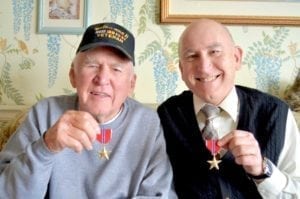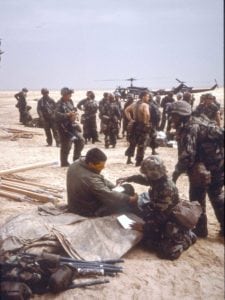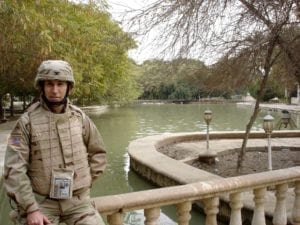Richard Briggs hates sitting in traffic.
“Nashville’s is awful, it’s growing so fast. Middle Tennessee is one of the fastest growing parts of the country.” Richard is a Tennessee State Senator, elected in 2014. He lives in west Knoxville but spends most of his week in Nashville when the legislature is in session. When it’s not, he heads up the cardio-thoracic surgery program at Mercy Medical Center St. Mary’s in north Knoxville. He mentions the traffic in west Knoxville and a once-intended plan for an Interstate 75 bypass and the once-discussed toll roads that would have helped fund it. “Think…West Knoxville, without all that traffic coming through.” Richard has thought about it a lot.He goes on about the trucking industry and the gas tax.

He was born on December 7, 1952, in West Point, Kentucky, a tiny town founded in the 1780s by his ancestor James Young (it has no connection to the military college). West Point sits on the banks of the Ohio River, in the shadow of Fort Knox. Richard’s father and one of his two younger brothers still live there. His father was in the US Army and Richard had always known he wanted to follow in those footsteps. “Where we grew up in Kentucky, our town was almost completely surrounded by Fort Knox, so we always had exposure [to the military]. All my friends’ fathers had served in World War Two, my dad had, too, and I wanted to be like my dad. He was in the infantry, wounded in France and Germany… we’d hear their stories.” He also knew he wanted to be a doctor. “Our town was tiny and very blue-collar. We went to high school in Elizabethtown and it always seemed like the doctors’ kids, the lawyers’ kids, and the well-to-do business-owners’ kids had a lot of advantages and I don’t mean just economic advantages…, so people started saying, ‘What do you want to do?’ And I started saying, ‘I want to be a doctor.’”
His desires for some of those advantages coalesced when he spent his senior year of high school in Chamonix, France, with the family of a retired French army colonel. “I still call him ‘my French father’. He had been an absolute war hero with the Resistance in World War Two… he had marched down the Champs-Élysées with Charles de Gaulle and was the director of an aluminum company [Pechiney SA]. We lived in the Alps. It let me, as my parents said, learn some manners; it let me learn how to deal with the upper classes. There was no television in the house; we had formal dinners every night and after dinner; we would sit for at least an hour and talk about literature or poetry or music every night. It was a good experience.” Richard says this exposure aided his military career: he was bilingual in English and French and had an interest in language; he’d spent time away from home, and he’d had experience in more formal settings. “For a little boy from Kentucky, it was quite an achievement.”
Doctor in Action among Soldiers
After high school, Richard began his B.S. in mathematics at Transylvania University, got married in 1973, and graduated in the spring of 1974. He was then commissioned as a second lieutenant in the US Army and spent the summer in California, attending Officer Basic training. “It’s not regular boot camp, but they still yell at you some.” He would spend the next 38 years splitting his time between learning and practicing medicine in the US—and as a battlefield physician and soldier, abroad. The Army sent him to medical school at the University of Kentucky in the autumn of 1974, calling him into active duty when school was out of session, so that even in medical school, Richard spent time on bases in Korea, California, Hawaii, and Texas. In May, 1978, he began a five-year general surgery residency at Brooke Army Medical Center in San Antonio and stayed on for a two-year specialty residency in cardio-thoracic surgery. “Heart surgery, lung surgery….That’s why when they sent me into a war zone, I could operate on the abdomen; I had been a general surgeon before that.”
In 1989, Richard had left active duty for a bit to practice medicine full time in Louisville, Kentucky. “We were doing the Jarvik artificial heart transplants… Bob (Robert Jarvik) was up there, too, on a National Institutes of Health grant.” But he’d remained in the Army Reserves and was called up in the beginnings of the Gulf War in November, 1990. “I was put in the 807th MASH (Mobile Army Surgical Hospital), and we were attached to the 1st Armored Division.” Richard earned a Bronze Star on that tour: he helped wrestle hand grenades away from an injured Iraqi who’d been brought in for treatment.

The Gulf War continued into 1992 and Richard took a position as a physician and surgeon at the University of Tennessee Medical Center. He deployed again in 1993 to Alexandria, Egypt, supporting operations in Somalia. He was promoted to full colonel, returned to his practice, and was deployed again in 1997 to South America for operations in Ecuador and Colombia. “There was a lot of narco-terrorism going on then. We went down in support of a small Special Forces unit that was assisting the Ecuadorian and Colombian armies and marines, trying to hunt down narco-terrorists in Colombia.” He then joined a private practice in heart surgery. In 2004, he was sent to Bagram Airfield, Afghanistan, where he was senior trauma surgeon. He would play the same role at a combat support hospital in Baghdad in 2005 and 2006 and treated ABC journalist Bob Woodruff after Woodruff received a Traumatic Brain Injury from a roadside bomb. “Baghdad was a bad tour. It’s that way in all wars, but this just got particularly bad. We do lose people, the medical units, anytime you’ve got an asymmetric battlefield, like we had in Iraq, where there is no front line, doctors and nurses killed… it was the same thing in Afghanistan.”
Richard himself was injured in Baghdad when an IED explosion rocked the convoy in which he was a passenger. “I hadn’t been there very long. I was in the vehicle right behind it and the only thing I had was an eardrum rupture. But the guys in the vehicle in front of us…. It killed the passenger and the driver lost an arm. And he kept on going, until he lost so much blood that he finally went up on the sidewalk and turned over.” His combat experience and his practice of medicine always worked in tandem. “A surgeon that has done combat tours—we have more experience in trauma than just about anyone in the country, particularly in Afghanistan and Iraq. Iraq really was intense.
They’d blow up a car bomb down in a market, 150 dead, and they’d bring 250 people in all at once, and that was a couple times a week, plus what was going on in the regular military operations. Most of the advances in trauma and surgical care come from our wars.”
He’s often asked to give presentations about these medical advances. “One of the slides is about medical advances between World War Two and Desert Storm. We’ve made more medical advances between Desert Storm and the War on Terror than we did between World War Two and Desert Storm. In World War Two, one in three soldiers died. In Desert Storm, one in five. Now we’re around one in twelve, one in thirteen. To me, that’s really, really amazing.” In both medicine and the military, Richard hasn’t been far from the action, and he says it’s not difficult to reconcile the “do no harm” aspect of his medical oath. When people are trying to kill you—when you’re fighting for your life—it’s hard for us to imagine here. When you’re in a remote area of Afghanistan and there’s going to be a winner and there’s going to be a loser, there’s no policeman to call, there’s no one else to call, you’re either going to live or die. It’s that raw.”
The Difference Between an Old Colonel and a Young Colonel

Richard doesn’t miss combat situations, but he found it very hard to leave the military for good, finally retiring from the Army in 2012. “Part of why I always liked the military was that I wanted to be out with the boys. I didn’t want to be based at Walter Reed; I wanted to be out with the combat support groups and MASH hospitals. You really develop a good relationship, where everyone’s depending on everyone else. The problem was I was becoming so much older than everyone else. I’d been a full colonel since 1995 and I was one of the senior colonels in Iraq. There’d be a group [of surgeons] in the evening, watching a movie on a laptop or something, and I’d walk in and they’d all jump up…. ‘No, no—sit down.’ ‘Yes, Sir!’ ‘No, you can relax, you can call me by my first name.’ ‘Yes, Sir!’” He laughs. “It just really got on my nerves. And their music in the operating room really drove me nuts. It just got to be too much of an age gap; I couldn’t be one of the boys anymore. There’s a saying in the Army that there’s a bigger difference between an old colonel and a young colonel than there is between a lieutenant and a young colonel. I had become the old colonel. It was time.”
He continued to focus on medicine and took the position at Mercy Medical, but he next turned part of his attention to politics. In 2007, following a Tennessee Supreme Court decision to uphold term limits in county government, Knoxville politics made national headlines. On January 31st of that year, the Knox County Commission held a special public meeting to fill the posts of those who would be out of office as a result of those term limits. During the well-attended meeting, commission members repeatedly shouted at one another, called frequent recesses in order to hold private conversations, and ultimately appointed friends and family members, violating Tennessee’s Open Meetings Act. The day lives in infamy as “Black Wednesday” and continues to reverberate in local politics today. Public outrage, several lawsuits, and a major grass-roots movement dedicated to the reform of local government led to the clearing of those appointments. It took a while for the dust to settle (and some would argue that the air hasn’t yet cleared), but when it did, the appointments were filled legally and Richard took one of the seats. He wanted to be a part of the reform. “They were outstanding citizens,” he says of his fellow appointees. “Some of the finest public servants the county’s ever had.”
Richard won the next election and kept his seat on the commission for a six-year term. He decided he wouldn’t run again for a commission seat and that he was going to focus on medicine full-time, but that didn’t last and he ran for the District 7 seat in the Tennessee State Senate. “Again, I wasn’t running for something, I felt like I was running against something. [Then state senator] Stacey Campfield was just a national embarrassment. I thought, ‘Somebody has got to do something.’ It just got under my skin.” Richard enjoys his time in the senate. He likes researching the issues and the constitutional law involved. He’s concerned about state infrastructure. He worries about access to healthcare in Tennessee’s rural areas. and he wants to expand Medicaid for those who can’t afford health insurance. He’s working on legislation concerning the licensing of legitimate pain clinics and the funding of opiates on the street by organized crime. “We’ve got a big problem. It’s really, really hard to fix this problem, and I think it’s going to take a long time.” If there’s a politician with the experience to work on the problem, it’s Richard Briggs.

I met Senator Briggs while advocating for the passage of Gov. Haslam’s “Insure Tennessee.” He was the rare voice of reason (and truth about the program and what it would have done for 280,000 uninsured Tennesseans). I appreciate his service to our country as a veteran and his service to our state as an elected official. I wish there were more like him!
Wonderful article!
Dr. Briggs is a true Tennessee Treasure.